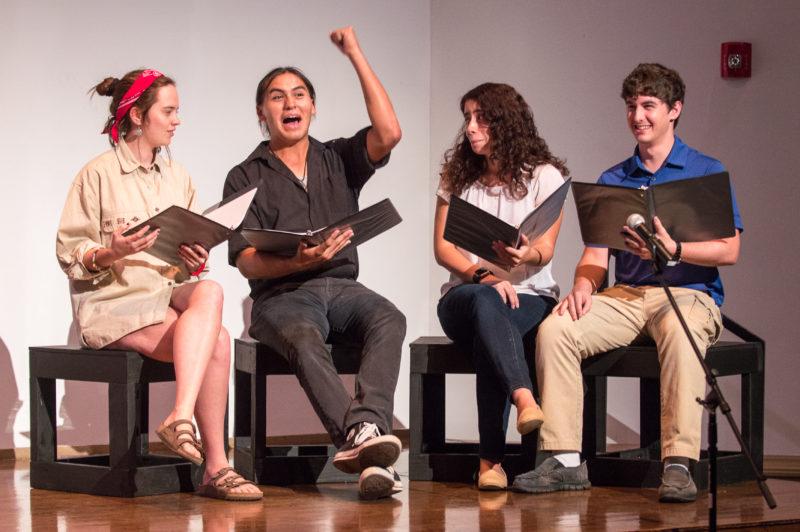Trinity professors brought an audience of more than 400 into the McNay Art Museum last Thursday for the premier of “To Be Honest,” a play that grew out of research conducted in the summer of 2016 led by three Trinity professors: Sarah Beth Kaufman, Habiba Noor and William Christ.
The research, funded by The Andrew W. Mellon Foundation and completed in tandem with students through the Mellon Summer Undergraduate Research Fellowship program, explored San Antonio’s honest perception of Islam during the 2016 U.S. presidential election. Hanna Niner, Savannah Wagner and Iris Baughman — all Trinity graduates as of this May — worked with junior Matthew Long to conduct 172 interviews.
The group gathered San Antonians’ candid views about Islam. Testimony ranged from strongly anti-Islamic views to more sympathetic opinions of the Muslim community. Since this research was relevant to current U.S. social issues, Kaufman and Noor wanted to release the data they collected from this research because, after President Trump’s election, anti-Islamic sentiment grew stronger. They decided to deliver the research in a creative way: Instead of a typical academic article, they constructed it into “To Be Honest,” directed by former Trinity theatre professor Stacey Connelly.
This research was inspired by “The Laramie Project,” a play taught in the Social Justice First-Year Experience course. Like “The Laramie Project,” this play is basically a montage of interviews.
“I sent it to Dr. Kaufman saying, ‘This is the Laramie Project,’ ” Noor said.
At that point, they knew they had to do this. They wanted people to listen to the responses and capture the state America was in after Trump’s “Muslim ban” controversy. Noor had dedicated her doctoral research to studying Muslim communities.
“It’s not about the religion. It’s about this dividing point,” Noor said.
These San Antonians’ honest perception of Islam brought uniqueness to this issue since San Antonio is a blue city in a red state. Niner, Wagner, Baughman and Long were able to bring quality to this research by interviewing people of different ethnic, cultural and religious backgrounds.
The controversy of this religion brings up other topics, like immigration and what it means to be an American, which can be seen in the play.“Let’s Be Honest” demonstrates that this issue is not a partisan one. As Noor pointed out, there are prominent liberals like Bill Maher who are anti-Muslim.
But how can we cure this negative perception of Islam? The answer is not simple. Many people have tried to educate themselves on what the religion is, but sometimes this worsens their already-negative perception.
“Why do you have to know what it really is to give someone respect?” Noor said.
The group believes that the honest solution to this problem is mutual respect of people’s humanity. One of the goals of the play is to remind people that we are all human at the end of the day. They also want people to reflect on this issue since it’s not a conversation that most people have.
As of now, the play and its creators are receiving good press for the message it’s spreading. The San Antonio Express-News reported on them a couple of weeks ago, and they recently talked on Texas Public Radio about their play. This 70-minute production was a success, as the venue went over-capacity — McNay staff told the Trinitonian that about 15 late arrivals had to be turned away at the door.
The show will be presented on campus in the Stieren Theater on Oct. 15. The academics-turned-playwrights hope to bring this play out of San Antonio, and are currently trying to receive grants to take it to other cities.
with reporting by editor-in-chief Daniel Conrad







